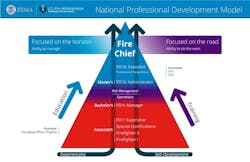“Don’t waste your money, look how far I’ve made it without a degree.” “College degrees don’t put fires out.” Sound familiar? Have you heard statements like these from fire officers or senior firefighters? I know I have. In the beginning of my career, I may have even agreed with them. After all, the department provided me all the training that I needed, right?
Some individuals may experience tremendous success over the course of their career with minimal or no higher education, but that scenario is waning. Although much of the basic work, from an emergency response perspective, remains the same, the environment in which you work, and the expanse of services being provided is constantly evolving. This brings about new challenges that must be met with creative solutions—solutions that may include influence from outside of ourselves. We can no longer operate in a vacuum.
Increased professionalism
Just over 20 years ago, fire service leaders formally memorialized their recognition of the need for higher education and education standardization within the fire service with the creation of the Fire and Emergency Services Higher Education model (FESHE.) FESHE recognizes that firefighters, especially those aspiring to rise in rank, need both skills training and higher education in order to successfully carry out their mission. The fire service does a good job at providing skills training, but by in large has not answered the call for higher education, resulting in a one-dimensional workforce being charged with answering multi-dimensional challenges. Higher education, along with training and the experience that is gained through simply doing the job, will be paramount to the success of many fire service members moving forward.
The fire service is dynamic, with a culture that is largely resistant to outside influence. Overall, the fire service has done a good job of providing training and service through traditional delivery models. However, increased reliance on the fire service for EMS and many other specialized needs has created the need for more professionalization of the service. This has increased the demand for training, credentialing and education.
I could go on and on about the benefits of higher education, such as higher financial earning potential, better overall health, learning how to collect and analyze data, and how to construct and manage complex budgets; however, I want to distill the benefits down to a few salient points that are applicable to every corner of the fire service, but maybe not so recognizable. Let’s focus on higher education from the 30,000-foot view.Higher-order thinking
Higher-order thinking is an ideology of educational reform focused on one or more learning taxonomies. A learning taxonomy is simply a system or framework used to classify levels of understanding. The term higher-order thinking is often used as an umbrella phrase inclusive of critical thinking and problem-solving skills. While these skills serve as a strong foundation for education and learning, higher-order thinking is a much more comprehensive and globally minded ideology that seeks to go further than the acquisition of rote memory, but rather the mastery of advanced analysis, evaluation and creation.
Problem solving is often a momentary process—a process in which one seeks to restore order where it does not exist. Requiring creativity, firefighters are some of the best problem solvers. When called to a scene, we are often able to quickly diagnose what is immediately wrong, devise a solution and take the necessary action to mitigate the issue. However, this process is often guided or influenced by our own subjectivity and tradition, which can lead to inefficient or outdated solutions, rather than adhering to or creating new best practices.
Critical thinking on the other hand is more of a continual process that requires you to challenge your own presuppositions. This skill is useful in many aspects of the fire service, and life in general, not just when operating on an emergency scene.
Higher education provides an environment in which problem-solving skills and critical thinking are developed together. The result: higher-order thinking. Higher-order thinking requires that we look at facts. It requires that we understand them, make inferences, look for relationships by categorizing and manipulating them, creating new solutions by combining them in new and creative ways, and applying them to solve new problems.
Higher-order thinking includes the identification and connection of concepts, visualization and questioning, generation of ideas, analysis through critical thinking, and synthesizing and applying practical solutions. It allows the construction of parallels, such as metaphors, analogies and similes, all used to conceptualize ideas through various lenses.
The relationship between critical thinking, problem solving and metacognition (which we will review in a moment) is very much interdependent. One's problem-solving ability can often be seen in process, whereas critical thinking ability is exposed in outcomes. Basic problem solving can occur in the absence of critical thinking, but will yield greatly improved outcomes in its presence.
Communication
Have you ever been a party to a controversy stemming from miscommunication? Been questioned by a superior or in court about a call due to a misunderstanding over your documentation? Have you been denied a request because you were unable to convey your message in an articulate manner?
As public safety professionals, we communicate each day in everything that we do. We use both written and oral communication with each other, the public, other agencies, and in report-writing. We discuss our calls, conduct public education events and often find ourselves explaining or justifying our actions.
In addition, not all communication is positive. Sometimes we find ourselves explaining to a citizen why our efforts to save their home were unsuccessful. Or it may be that you need to discipline or deliver bad news to a colleague or friend. Conveying a negative message in a positive, constructive way is possible, if communicated properly. Communication can change the course of a call, affect relationships with colleagues, lead to the success or failure of a program or effort, and even end a career.
The act of pursuing higher education itself offers a great opportunity to hone one’s communication skills. You can expect to spend significant time on writing assignments, which will greatly improve written prose, while discussing and debating topical material can improve your public speaking through expanding vocabulary and increasing confidence. This can be invaluable in speaking with the general public, especially in the age of social media. The experience of repeating these exercises over and over, often with thoughtful critique and input from a professor and classmates, lends itself to ensuring that you remain objective and use logical reasoning, adhering to sound research.
Many times, you hear firefighters explain that we are mostly “type A personalities.” This makes communication all that more important. We want to be in charge, we do not want to be criticized, and oftentimes, we listen to respond, rather than listening to hear the message. We are passionate, opinionated and sometimes lacking in this interpersonal skill.
Becoming a better communicator will allow you to articulate your thoughts and feelings in a clear, concise and objective manner. When this is done, it often opens opportunities to collaborate with others in order to achieve personal and organizational objectives. Ultimately, it makes you more effective as an individual. Improving your communication skills will be a huge asset to your career and your organization.
Reflection
Reflection is simply giving something considerable thought or consideration, typically retrospectively. Two important components of self-reflection that are often improved upon through higher education are that of introspection and metacognition.
Introspection is looking inward, specifically at your own mental and emotional processes. This can prove helpful in identifying your strengths and weaknesses and is an essential part of critical thinking. This can help you close the gap between where you are and where you want to be.
In staying with the theme of higher-order thinking is the more advanced ideology of metacognition. While introspection allows one to look within, metacognition is the process of thinking about one’s thinking, or knowing what you know. It is understanding the way you think and learn. This helps you develop a self-awareness, which is essential to understanding how you can best achieve your goals.
Have you ever participated in a post-incident analysis or completed a performance evaluation for a student or subordinate? These are similar in concept, only that you are performing the gap analysis outwardly on other people or an incident. Reflection is not as easy as it sounds. It takes discipline, objectivity and humility, all of which are invaluable consequences of higher education. Many higher education institutions incorporate the fundamentals of reflection into instruction.
Attending a program with like-minded individuals who share similar interests and the same desire for success and self-improvement will prove to be an invaluable part of becoming a practitioner of self-reflection. It also affords you the opportunity to gain differing perspectives on common topics. Through discussion and reflective writing exercises, this skill will become a vital component of your pursuit of self-actualization.
Attending college, especially graduate school, became a time of self-discovery for me. I experienced tremendous personal growth and clarification of what my strengths and weaknesses were, as well as my interests and what I wanted to pursue further in order to leave a lasting impact on those with which I work and walk through life.
One of the side effects that you may experience through higher education and enhanced metacognition is the growth of epistemological humility (essentially, discovery of what you don’t know.) This is a place where you begin to experience serious personal growth, acknowledging how your presumptions affect your thinking. This, in turn, allows you to become more objective, thereby improving your critical-thinking ability, which makes you a better problem solver. Are you starting to see the connections and interdependent relationships here?
When I was in graduate school, at one point I felt disheartened because the program was not going to lead me to a tangible, professional degree, which would immediately segue into a specific position or career field. However, with much support and encouragement from my wife, family and friends, I persevered. I distinctly remember driving home from class one day when it hit me. I began to see all the connections: Higher education was going to make me a better thinker. It’s that simple.
You become acutely aware of your gifts, as well as areas needing improvement. How are these affecting your situation? How can you change or leverage them to work in your favor? The identification of these areas and the personal growth that comes from finding ways to improve them is exciting and energizing.
Final thoughts
The pursuit of higher education is not easy, but nothing worthwhile ever is. It can be difficult to balance school with working full time, overtime, raising a family, and still trying to enjoy life. I know, I did it. And I am not saying that every firefighter needs a master's degree or cannot achieve success without one. While almost any higher education program will help you grow as a practitioner of higher-order thinking, communication and reflection, program selection is key. Selecting a program that is well aligned with your personal and career goals will best serve you in closing the gap between where you are and where you want to go. Knowledge, through higher education, is power.
About the Author
Glenn James
Glenn A. James II is a 14-year member of the Anne Arundel County, MD, Fire Department, currently serving as captain. During his career, he has served as a firefighter, paramedic/tactical medic, fire marshal and company officer. James has a master’s degree in organizational leadership from The Johns Hopkins University, as well as undergraduate degrees in public safety/fire department administration and EMT-paramedicine. He holds the designations of certified fire protection specialist from the NFPA and that of fire officer and fire marshal from the Center for Public Safety Excellence. James also serves as the president of the Anne Arundel County Professional Firefighters Burn Foundation.

